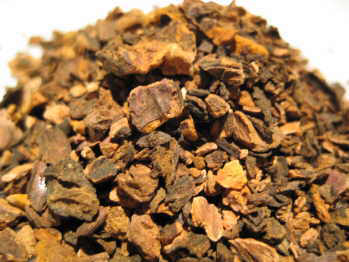Description
Botanical: Rheum officinale
Rhubarb Root is an ancient and gentle, but extremely effective, laxative. It supports good colon health by cleansing it and helping to treat constipation; and in smaller doses, its astringents have been used to ease diarrhea, bleeding and hemorrhoids. Rhubarb Root is considered a wonderful cleanser for the intestines, bowels, liver and blood, helping to rid the system of accumulated toxins. It is also anantimicrobial, antibacterial, antibiotic and antiviral, and it may even help to improve your digestion.
Country of Origin: Turkey
Beneficial Uses:
The bitter principle included in Rhubarb Root is said to stimulate digestion and improve the appetite. It is considered a "stomachic" that relieves gastric disorders, improves the appetite and gives tone and strength to the stomach. Rhubarb Root is thought to be particularly effective in treating atonic dyspepsia, helping the digestive organs when in a condition of torpor and debility. In addition, the herb is also believed to encourage gastric flow, which also aids the digestive process.
Rhubarb Root is considered an anti-microbial that has been used to treat intestinal worms, including internal pinworms, threadworms and ringworms.
Rhubarb Root is thought to possess antibacterial, antibiotic and antiviral properties. In modern medicine, Rhubarb Root has been found to be useful in treatment of hepatitis-B virus. In vitro studies, the anthraquinones in Rhubarb exhibited virucidal activity against HSV I, measles, polio and influenza virus; and the rhein component showed antibacterial activity against Bacteroides fragilis, but thus far, no conclusions have yet been published. Teas made from Rhubarb have been said to help relieve infection caused by bacteria.
Rhubarb Root may be used externally to fight inflammation and infection (skin eruptions, boils and carbuncles, etc.) and to promote healing (wounds, cold sores and burns, etc.).
Contraindications:
Pregnant and nursing women should not use Rhubarb Root, nor should it be used by those who suffer from colitis or have intestinal obstruction. Long-term use is not recommended, as it may cause dependence and tendency toward chronic constipation, nor should it be taken when the colon is already empty (do not take Rhubarb longer than eight to ten days). People with a history of renal stones or urinary problems should avoid Rhubarb Root (and any herbs with oxalates). Never eat or cook Rhubarb leaves as a food. Oxalates are contained in all parts of Rhubarb plants, especially in the green leaves, and are considered extremely toxic. There is some evidence that anthraquinone glycosides (the active purgative ingredient) are also present and may be partly responsible.
The stalks and roots contain low levels of oxalates, so this does not cause problems. Do not take Rhubarb without talking to your doctor first if you are taking blood thinning medicine: examples: warfarin (Coumadin), clopidogrel (Plavix), aspirin, enoxaparin (Lovenox), dalteparin (Fragmin) or blood disease medication (Sulfinpyrazone). Children under twelve years of age should never take Rhubarb, except under the direct supervision of your family physician. Using Rhubarb Root may temporarily cause the urine to appear yellow or red, but this is a common occurrence and no cause for alarm.
This extract was taken from http://www.herbalextractsplus.com. Visit the site for further reading.


